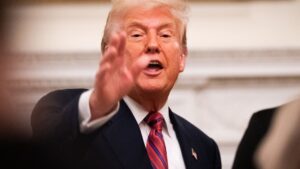Henry Kissinger once compared himself to the lone cowboy who rode into town to sort out the bad guys. But the U.S. secretary of state, who also served as national security adviser, knew different when it came to dealing with major powers. His hero was the Austrian statesman Klemens von Metternich, who somehow brought together the unlikely combination of Austria, the United Kingdom, Prussia, Russia, and a number of even smaller allies and their incompatible leaders into the alliance that finally defeated Napoleon in 1815. As Kissinger understood, even lone rangers need friends.
It is an insight that appears to be lost on U.S. President Donald Trump. Since returning to office in January, Trump has called the United States’ closest allies cheaters and freeloaders. Japan and other Asian trading partners, he insists, are “very spoiled”; immediate North American neighbors stand accused of exporting drugs and criminals. He freely and publicly labels the leaders of some of the United States’ most important democratic partners as has-beens, weak, or dishonest, while heaping praise on autocrats he finds easier to deal with, such as Hungarian President Viktor Orban (“a very great leader”), Salvadoran strongman Nayib Bukele (“a great friend”), North Korean dictator Kim Jong Un (“a smart guy”), and—at least until very recently—Russian President Vladimir Putin, whom he has called “a genius” and “very savvy” in attacking Ukraine. In what would have been unthinkable in previous administrations, including Trump’s first, the United States in February even sided against its own democratic allies and with Russia and other authoritarian states, such as North Korea and Belarus, in voting against a UN resolution that condemned Russia’s aggression against Ukraine and upheld the latter’s sovereignty and territorial integrity.
Perhaps most baffling, at a time when Washington is trying to contain China and shore up U.S. defenses in the Indo-Pacific, the administration is preparing punitive tariffs on South Korea and Japan, the United States’ closest Asian allies, as well as on a sweeping list of European partners it is trying to keep away from Beijing. U.S. allies around the world are also rattled by the public musings of Trump and members of his cabinet that the so-called nuclear umbrella under which the American nuclear deterrent was a guarantee for their defense is no longer a sure thing. Such is now the level of doubt that in July, France and the United Kingdom announced a new agreement to begin providing extended nuclear deterrence in Europe for themselves, and allies such as South Korea, Poland, and even Japan have begun to contemplate acquiring their own nuclear weapons.
The past offers plenty of examples of world powers falling out with erstwhile alliance partners or seeking new ones. But it’s hard to think of a case in which the leader of a major alliance has so casually and brutally cast aside allies that, for the most part, have been dependable and have accepted its writ. If the United States wants Canadian or Greenlandic resources, those have always been available. Threatening annexation is counterproductive, stirring up anti-Americanism as it has already done. Washington’s NATO allies, it is true, have not been spending enough on defense but that is partly because the United States has insisted for decades on having the dominant role. And when pressed, as at the most recent NATO summit in June, members of the transatlantic alliance have increased their defense budgets, or pledged to do so, to levels that could not have been imagined only a few years ago.
It is difficult to find a plausible explanation for the policies of the second Trump administration. If the president is impatient with existing alliances, he has offered few alternatives beyond an apparent attachment to the old concept of spheres of influence, in which a handful of powers dominate their immediate neighbors, and multilateral organizations, if they survive at all, have little power or authority. Such a world offers greater threats in the future to the United States as the other spheres—presumably including a Chinese-dominated Asia and perhaps a Russian zone in eastern Europe and Central Asia—jostle against it and smaller powers within each sphere either accept their fate often resentfully or look for new hegemons.
By trashing alliances that have served it well, the United States risks a general breakdown of stability and order that will, in the long run, prove highly costly, whether in military expenditure or unending trade wars, as each great power seeks advantage where their zones of interest meet. The striking lack of historical precedents for such behavior does not suggest a clever Machiavellian policy to enhance American power; rather, it shows a United States acting against its own interests in bewildering fashion, undermining one of the key sources of that power. And this comes at a time when American global leadership and economic and technological dominance are already under growing pressure from China and other major rivals.
THE POWER RULE
For centuries, the value of alliances, even among highly disparate countries, has been accepted as a key element of international relations. As far back as history has been recorded, groups, whether clans or nations, have come together for protection against common enemies. In the fifth century BC, the Delian League of Greek city-states defeated the Persian Empire; in 1815, the Grand Alliance of Austria, the United Kingdom, Prussia, and Russia joined forces to vanquish Napoleon’s France. Common cause can bring together the most unlikely partners, such as Catholic France and the Muslim Ottoman Empire, which joined forces in the sixteenth century and remained allies for more than two centuries, or Joseph Stalin’s Soviet Union with the United Kingdom and the United States, which together defeated Germany and Japan and the other Axis powers in World War II.
Before the world became so interconnected and communication was more difficult, geography allowed some states to live without allies. Japan was able to remain in lonely isolation for two and a half centuries until it was confronted with a different and more expansive world when the U.S. naval officer Commodore Matthew Perry came calling in 1853. The United States, protected as it once was by two oceans and with no powerful enemies along its land borders, prided itself for much of its history on avoiding alliances. Even when it belatedly entered World War I on the Allied side, President Woodrow Wilson insisted that the United States was an “associated power” rather than an ally. Only after 1945 did it abandon this suspicion of alliances. Facing a hostile Soviet Union and communist China, the Soviets’ then close partner, it entered peacetime defensive alliances, foremost among them NATO, for the first time in its history. As we see today, the isolationist strand in American foreign policy never entirely went away.
As Kissinger understood, even lone rangers need friends.
As the Truman administration learned 80 years ago, even powerful states need allies, partly for reasons of prestige but also because great power has its limits and is costly to maintain. By the late nineteenth century, the British Empire, the biggest the world had ever seen, was experiencing what the historian Paul Kennedy called “imperial overstretch” as it confronted both old rivals, such as France and Russia, and newer ones such as Germany, Japan, and the United States. The British economy was still powerful and its navy ruled the oceans, but others were catching up. The British Treasury and the British taxpayer grumbled at the expense of maintaining dominance.
How widely the United Kingdom had come to be resented was made clear when it struggled to crush the two tiny Afrikaner republics (the Transvaal Republic and the Orange Free State) in the South African War of 1899–1902. The early Afrikaner victories not only showed the inadequacies of the British Army but were generally welcomed around the world. The brutal treatment of Afrikaner civilians further undermined the reputation of the British Empire. At the Paris Exposition in 1900, admiring crowds piled flowers at the Transvaal Pavilion. The realization of how much they were loathed shocked the British into seeing that even they needed friends. In short order, the British government reached understandings with its rivals France, Japan, and Russia, which lessened the chance of conflict with each and encouraged cooperation, and so mitigated the overstretch. The United Kingdom, in the eyes of its contemporaries, remained the world’s dominant power, arguably until the middle of World War II.
As the British experience demonstrates, global power cannot be measured in military resources alone. It is relatively easy to count guns, ships, aircraft, economic output, or scientific and technological strengths, but it is not so easy to gauge competencies, organizational capacity, effective government, or morale. Russia looked strong before its full-scale invasion of Ukraine in 2022, and for China, Iran, and North Korea, a desirable ally. Today, after three and a half years of unsuccessful war and heavy losses, Russia may be more of a liability. A state has to have credibility in the eyes of others, whether allies or enemies or its own people. When Soviet Russia in the 1980s and then the United States in the first decades of this century failed in Afghanistan in spite of their overwhelming military advantage, those failures dismayed their own allies, pushed away the uncommitted, and shook the faith of their own peoples in their governments while encouraging potential enemies. The Bolshevik Revolution of 1917, which was made possible by Russia’s military defeats, should have warned the Soviet regime itself of the consequences of failure—and should be a warning to Putin today.
Nor is power a constant. Despite being on the winning side in both world wars, the United Kingdom found its resources depleted and its empire melting away. Is the United States as powerful as it once was? It has had failures abroad, notably in Afghanistan and Iraq, is increasingly divided at home, and has an exploding national debt and waning investment in crucial infrastructure. And in an age of increasingly fast and long-range missiles, geography no longer provides the barrier to adversaries that it once did. All the more reason to nurture alliances with sympathetic powers rather than spurn them. Canada has never been a threat to the United States, except in hockey, and Canadians have long seen Americans as their close relatives. The border between the two countries is the longest undefended one in the world. The two economies are closely intertwined.
Yet what Trump has done with his talk of the 51st state, his imposition of punitive tariffs, and his threats that the United States will not defend Canada under the proposed Golden Dome missile defense system unless it pays up (and he keeps raising the putative bill), has enraged a normally mild-mannered people. In Ottawa, the mood is one of shock and disbelief. What had seemed the unquestionable bases of Canadian foreign policy are melting like the glaciers in Greenland. What is being destroyed will not be easily mended, certainly not for a generation. And for what?
CONSTANT GARDENERS
Like many other human relationships, alliances are hard work: their management requires patience, forbearance, skill, and, like a garden, repeated tending. The stakes are often high, and the character of the leaders and diplomats involved can be critical. Diplomacy is not about going to cocktail parties, although socializing is part of it. Rather, it is gaining insight into other nations and their leaders and learning how to negotiate with them. Publicly chastising allies on their supposed faults, as Vice President JD Vance did with the Europeans at the Munich Security Conference in February, barking out orders and insults on social media, as the president does almost daily, or publicly releasing letters to other heads of state before they have been delivered to the recipients, only stores up resentments and makes future personal relations more difficult.
If Kissinger had not been able to establish a rapport of mutual respect with his Chinese counterpart, Zhou Enlai, the opening of relations between the United States and China during the Nixon administration might have been delayed for years. The case of British Prime Minister Winston Churchill and U.S. President Franklin Roosevelt is perhaps even more telling. From the time that war broke out in Europe in 1939, Churchill worked on, as he put it, wooing Roosevelt like a suitor. He knew that, to prevail, the United Kingdom needed American resources, such as guns and money, and eventually, he fervently hoped, American forces. And for his part, Roosevelt did not want the British to fail. Although he was at first constrained by the American public, which resisted entering the war, he stretched the powers of the presidency to provide as much assistance as he could.
As World War II unfolded, the two leaders traveled thousands of miles by ship and plane to meet each other and Stalin, often at risk to their health and their lives. Without the strong personal relationship between Churchill and Roosevelt, the irritations and cross-purposes that exist in any alliance would have greatly hampered joint strategic planning and vital U.S. military aid under the Lend-Lease Act. The partnership between their two countries was amplified and strengthened by the thousands of experts, administrators, publicists, intellectuals, and serving military who learned, not always easily, to work with one another.
Global power cannot be measured in military resources alone.
Consider the deep and rare friendship that John Dill, the United Kingdom’s senior military representative in Washington, established with the reserved George Marshall, chief of staff of the U.S. Army and Roosevelt’s most important military adviser. Together, the two generals were able to reconcile what were often deep and sometimes acrimonious divisions among their colleagues and between their political masters. Although Churchill and his successors exaggerated just how special the postwar “special relationship” was, it served both the United States and the United Kingdom well from the Berlin airlift at the start of the Cold War to the fall of the Berlin Wall at its end.
Alliances are also unlikely to last beyond their immediate purpose. Churchill and Roosevelt were far less successful in their effort to build a more lasting friendship with Stalin and his Soviet Union. The gulf between the democracies and the Soviet dictatorship was too great: Soviet memories of Allied intervention against the Bolsheviks at the end of World War I, the strained relations of the interwar years, and the deep suspicions, partly born out of Russian history and partly out of Marxist assumptions about the coming final battle between capitalism and socialism, made ordinary relations almost impossible. The need to defeat Nazi Germany and Japan’s military dictatorship was the main glue that held the Grand Alliance together, and when that vanished, so did the relationship. That had happened repeatedly throughout history, whether in the collapse of the Delian League once Persia had been defeated or the Balkan States waging war on one another in 1913 once they had together defeated the Ottoman Empire.
While they are impossible to measure, emotions such as liking or hatred, admiration or contempt—the quotidian stuff of human relations—play a crucial part in making and unmaking alliances. Personal friendships and mutual respect and trust are the oil in the complicated machinery that helps them last. On repeated occasions since 1945, British and American leaders—Harold Macmillan and John F. Kennedy, Margaret Thatcher and Ronald Reagan, George W. Bush and Tony Blair among them—have had good relations that have helped reinforce the partnership between their countries. In the absence of such chemistry, or at least some measure of trust between leaders, however, relations can deteriorate surprisingly quickly, as the world is witnessing again today._Alexander I of Russia chafed under Napoleon’s patronage and gradually drifted toward his enemies. Mao Zedong and his colleagues increasingly resented Soviet assumptions of superiority and leadership of the world communist movement, while Stalin’s successor Nikita Khrushchev found the Chinese devious and untrustworthy—contributing to the very public and bitter Sino-Soviet split after 1962.
THROWING AWAY THE CARDS
Since 1945, dozens of countries in Asia, Europe, and the Middle East have depended on their security relationships with Washington. This includes the 31 other members of NATO; Asian countries with formal U.S. military alliances, such as Australia, Japan, and South Korea; and those with less formal but far-reaching U.S. military partnerships, such as Israel and Saudi Arabia. And then there are those countries around the world such as Chile and Vietnam that have tended to work with the United States on a friendly basis. This impressive variety of countries has welcomed U.S. protection and leadership over the decades since the end of World War II not just because the American superpower was strong but because it represented hope for a better and fairer world.
Yet there is now the real possibility that the Western alliance is joining the list of ones that failed. Trump has always been uncomfortable with the give and take of alliance politics. This may be in part because of his own experience in business where he was usually the unchallenged boss. He ran his companies with small offices, unlike the big corporations with their structures and outside boards. In his show The Apprentice, his notorious line was, “You’re fired!”
In his first term, Trump seemed especially uneasy at multilateral meetings where he had to deal with other leaders as equals, such as the G-7 meeting in Canada in 2018 where he arrived late and left early but not before quarreling with the other leaders over their trade policies and tariffs. He further shocked allies when he unilaterally pulled out of important and painstakingly negotiated agreements such as the Paris climate accord and the Joint Comprehensive Plan of Action to limit Iran’s capacity to develop nuclear weapons (an agreement that bears a distinct resemblance to the one the second Trump administration offered Iran, at least until it was drawn into bombing Iranian nuclear sites in June). Striking a note that became the leitmotif of his second term, he complained, “We’re like the piggy bank that everybody’s robbing.”
Today, Trump is freer to act on his impulses because those established and respected advisers who stood up to him in his first term have been replaced by courtiers and sycophants. From time to time, Trump still has to deal with other democratic powers or even multilateral organizations, and he has made clear his impatience with them. With few exceptions, the Oval Office has become the stage set for a demonstration of Trump’s dominance, and when he makes an appearance at international meetings, he keeps it as brief as possible. And the gratuitous insults—to NATO allies, the European Union, the BRICs, the United Nations, or the World Health Organization—continue to flow from the president. It is hard to make out an overall purpose beyond keeping him the center of attention.
Trump prefers to treat international relations as a series of transactions, holding face-to-face meetings or long phone calls with only one other leader at a time, and seems distinctly more at ease with powerful autocrats than democratic statesmen. If necessary, he will bludgeon both friends and adversaries into submission, assuming they will abandon any opposition if the offer on the table is good enough or if Washington seems to hold the best hand. (“You don’t have the cards right now,” he told Ukrainian President Volodymyr Zelensky in the now infamous Oval Office dressing down.)
If only it were so simple. Nations do not always act on what others assume are their best interests. Hitler thought in 1940 that the United Kingdom had little choice but to capitulate just as Putin believed that Ukraine would give up in a matter of days in the face of the Russian invasion. As Roosevelt had come to realize by the time he died in the spring of 1945, leaders can define interests in different ways. Beliefs and cultural and personal differences can matter as much as more objective factors such as demographics or geography. Stalin came out of a very different world and had very different experiences and goals than did the privileged son of an old American family.
AMERICAN CARNAGE
In Trump’s world, mutual trust and respect, so hard to establish and so easy to destroy, do not matter. Parties will work together if it suits their interests and only until a better offer comes along. Russia sees the advantages of friendship from the United States. European allies will grumble but do what Washington wants or find themselves alone and friendless. China will negotiate on trade, promising for example to buy American agricultural products because it does not want to be shut out of U.S. markets. And if Beijing wants Taiwan, why not let it have it as long as the United States gets something in return? The president seems to assume that current and potential allies see international relations as he does. If you lose one round you may win the next. Yet nations, like individuals, have long memories of past wrongs or defeats, as Trump himself should know.
Trust among individuals or nations is hard to measure, but lasting and productive relations cannot exist without it. During the Cold War, negotiations between the Soviet Union and the United States over arms control were tortuous and drawn out because neither side trusted the other. Incidents such as the American pilot Gary Powers’s intercepted U-2 flight over the Soviet Union in 1960 or the Soviet shooting down of the Korean airliner in 1983 tended to be read by the other side as evidence of malign intent. By contrast, although there were certainly tensions between the United States and its allies, each generally assumed their counterparts were acting in good faith, and there was a willingness to discuss tricky matters and search for mutually acceptable solutions. That no longer exists today and cannot be easily or quickly rebuilt.
The Western alliance could be joining the list of ones that failed.
The United States is now experiencing what the United Kingdom did even in the heyday of its empire. Being the world’s greatest military power is a heavy burden, and partly as a result, the U.S. debt continues to grow to staggering levels. Ambitious powers, China in particular, are pouring resources into an arms race that gets ever more expensive. And, as has happened many times before, other nations are tempted to abandon the old power for the new or group against it to take advantage of what they see as its decline. If Trump’s current hostility to alliances continues and the administration keeps insulting, belittling, and even economically harming its long-standing partners, the United States is going to find the world an increasingly unfriendly place.
Former allies or uncommitted powers may decide, as the Slovak Republic or Serbia have already done, that Putin’s Russia is a better bet; others may bypass the United States with new trade arrangements or, as is happening with European nations and Canada, sharing in their own military production, planning, and mutual deterrence, on the assumption that the United States is no longer a dependable ally. In a harbinger of things to come, Canada has just shipped its first container of liquefied natural gas to Asia. The British once called their position in the world “splendid isolation” until they realized the costs were too high. Trump’s United States may find that, in the dangerous twenty-first century, those splendors are overrated.












